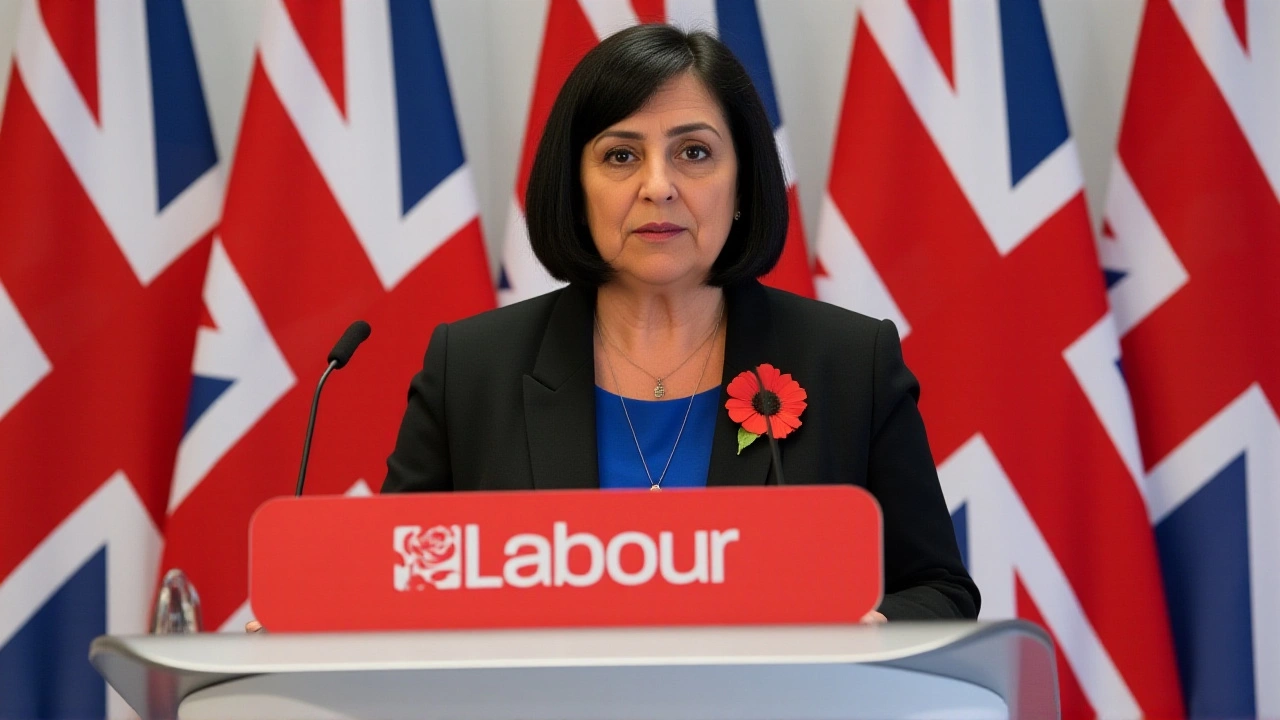Mahmood’s asylum overhaul: No more housing or cash for those who can work or break law

When Shabana Mahmood, the UK’s new Home Secretary, stood before Parliament on November 16, 2025, she didn’t mince words: "When home is safe, we’ll send you back." Her announcement marked the most dramatic shift in British asylum policy in a decade — one that strips statutory support from those deemed able to work or who’ve broken the law. No more housing. No more £49.18-a-week allowances. Not even the £10 cash top-up if meals are provided. The message is blunt: Britain won’t subsidize those who can fend for themselves — or who violate the rules.
The Pull Factor That Broke the System
Mahmood’s reasoning cuts to the heart of a political crisis. For years, critics — especially Reform UK — have hammered Labour for being "soft" on immigration. The numbers didn’t help: over 120,000 asylum applications in 2024 alone, with wait times stretching past 24 months in some cases. Meanwhile, support payments have been frozen in real terms since 2010. By 2024, the £49.18 weekly allowance was worth 37% less than in 2000, even as rents and food prices soared. Yet the perception — fueled by tabloids and political ads — was that asylum seekers were living better than many low-wage British workers."For too long the UK has offered a package of benefits and support that far exceeds our international obligations," Mahmood said, citing a 2023 Migration Observatory report that found asylum seekers rarely qualify to work — only 3% of applicants in 2024 were granted permission, and only if their claim sat unresolved for over a year and the job was on the Immigration Salary List. That list, designed for skilled visas, is now under threat of abolition, leaving even those eligible in legal limbo.
Three New Paths — But Very Few Seats
The policy isn’t just about taking away. It’s about redirecting. Mahmood unveiled three new legal routes, each capped, each tightly controlled:- Community Sponsorship — expanded from the Homes for Ukraine model, letting local groups house and support refugees. But unlike Ukraine, there’s no government funding. Sponsors must cover everything: rent, food, language classes.
- Talent Pathway — for displaced engineers, doctors, teachers. The Home Office will work with UNHCR to identify candidates with skills in shortage. First-year cap: 1,500.
- Study Route — students fleeing war can enroll in UK universities, but only if they’ve been accepted and can prove they’ll leave after graduation. Cap: 1,200 per year.
"These numbers are very modest," Mahmood admitted, "but they’ll grow — slowly, responsibly." All applicants will be vetted by the Home Office before departure. Security checks, biometrics, interviews — done before they board the plane. No more "arrive and claim".

Denmark’s Shadow Over Dover
The plan mirrors Denmark’s controversial 2021 asylum reforms, which stripped benefits, banned family reunification, and even offered cash incentives for refugees to return home. Critics called it inhumane. Supporters said it stopped the flood. Mahmood’s team has quietly consulted Danish officials. "We’re not copying them," one source told me. "We’re learning from their mistakes — and their results. Immigration dropped 60% in three years. That’s not a coincidence."But here’s the twist: Denmark’s system still faces legal challenges. The UNHCR condemned its "deterrence-first" approach. And while the UK’s new routes sound compassionate, they’re narrow. The 2,700 total annual slots across all three programs? That’s less than 2% of last year’s asylum applications.
Who Gets Left Behind?
The biggest casualty? The vulnerable who don’t fit the mold. A Syrian nurse who arrived in 2023 with no family, no skills recognized here, and a claim pending since 2022? She’ll lose her housing. No job on the Salary List? No work permit. No family to sponsor her? No safety net. She’ll be told to leave — or sleep on the street."This isn’t about fairness," said Dr. Elena Ruiz, a refugee advocate at Refugee Council. "It’s about political optics. We’re punishing people for a system the government designed to fail. They created the backlog — now they’re blaming the victims."
Meanwhile, landlords are already preparing. One Birmingham property manager told me he’s received 14 inquiries from community groups wanting to sponsor refugees — but only two have the £30,000+ needed to cover a year’s rent, utilities, and support services. "It’s noble," he said. "But it’s not scalable."

What Comes Next?
The first wave of cuts begins April 2026. Asylum seekers whose claims are pending over 12 months — and who’ve never been offered a job on the Salary List — will receive a 30-day notice to leave accommodation. Those convicted of minor offenses — shoplifting, benefit fraud, trespassing — will be cut off immediately. Appeals will be heard, but without housing or cash, many won’t make it to court.Labour’s gamble? That by offering a "clean," controlled alternative, they’ll win back voters from Reform UK. But with only 2,700 spots available annually, and over 100,000 people currently in the system, the pressure will build. And if the new routes don’t fill their caps — if the world’s most desperate still can’t find a legal path — the moral cost could outpace the political gain.
Frequently Asked Questions
How does this affect asylum seekers already in the UK?
Those whose claims are pending over 12 months and who can now work — or who’ve been convicted of any offense — will lose housing and weekly support starting April 2026. They’ll get 30 days to find alternatives or leave. Those with no work rights and no criminal record may keep support — but only if they remain destitute and comply with Home Office reporting.
Can asylum seekers still work in the UK under the new rules?
Only if two conditions are met: their claim has been pending over a year through no fault of their own, and they’ve secured a job on the Immigration Salary List — which is being phased out. Without that list, even qualified nurses or electricians won’t qualify. The government hasn’t replaced it, leaving thousands in legal uncertainty.
Why are the new resettlement routes so limited?
The Home Office has capped all three new routes at just 2,700 spots total per year — a fraction of last year’s 120,000 applications. Officials say they’re "testing" the system, but experts warn this creates a lottery for survival. The UNHCR says the UK is now accepting fewer refugees per capita than any other EU nation.
What happens if someone can’t find housing after losing support?
They’re technically no longer entitled to public housing or emergency aid. Some may turn to charities — but many will end up sleeping rough. In 2024, over 1,200 asylum seekers were recorded as homeless in London alone. With cuts rolling out, that number could double within a year, straining already overwhelmed shelters.
Is this policy legal under international law?
The UK remains bound by the 1951 Refugee Convention, which prohibits penalizing asylum seekers for how they arrive. Removing basic support could be seen as indirect punishment. The UNHCR has already signaled concern, and legal challenges are expected. But without a court ruling, the policy proceeds — and many vulnerable people will suffer in the meantime.
How does this compare to previous UK asylum policies?
Unlike the 2022 Rwanda plan — which was blocked by courts — this policy targets support, not deportation. It’s more subtle, but arguably more pervasive. Previous governments cut support gradually; Mahmood’s plan is a single, sweeping removal. It’s the first time a UK government has made housing and food contingent on work eligibility or criminal records — turning humanitarian aid into a conditional privilege.